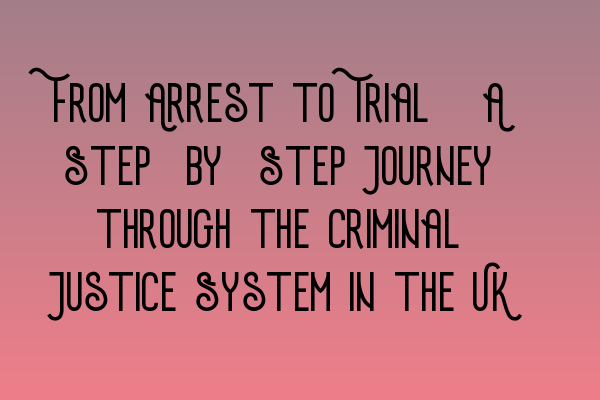From Arrest to Trial: A Step-by-Step Journey through the Criminal Justice System in the UK
When an individual finds themselves involved in a criminal matter in the UK, it can be an overwhelming and confusing experience. Understanding the process that one goes through from arrest to trial is crucial in ensuring that their rights are protected and they receive a fair outcome.
1. Arrest
The first step in the criminal justice system is the arrest. This occurs when a person is taken into custody by the police due to suspicions of their involvement in a crime. During the arrest, the individual is informed of their rights and the reasons for their detainment. It is essential that individuals are aware of their rights during this stage, including their right to legal representation.
If you have been arrested and need legal advice, it is recommended to consult with a criminal law solicitor. They can provide guidance based on their expertise and help protect your rights during the process. You can also refer to our SQE 1 Practice Exam Questions to familiarize yourself with the legal concepts relevant to your case.
2. Police Investigation
Following the arrest, the police will conduct an investigation to gather evidence related to the alleged crime. This may involve interviewing witnesses, collecting physical evidence, and examining any available CCTV footage. The investigation aims to establish a clear picture of what happened and who may be responsible.
If you are interested in learning more about the investigative process, our article on SQE 1 Practice Mocks FLK1 FLK2 provides valuable insights into the legal principles and procedures involved.
3. Charge or Release
Once the police investigation is complete, the individual may be charged with the alleged crime or released without charge. If charged, it means that there is sufficient evidence to proceed with a prosecution. However, being charged does not imply guilt, and the individual is still entitled to a fair trial.
For those who have been charged, it is crucial to seek legal representation as soon as possible. Our SQE Criminal Law & Practice Law UK solicitors have extensive experience in defending clients throughout the legal process. Feel free to explore our SQE 2 Preparation Courses for a comprehensive understanding of criminal law principles.
4. Court Proceedings
Once a person has been charged, court proceedings begin. This involves a series of hearings and appearances before a judge or magistrate to determine the validity of the charges and progress the case towards a trial. The stages can include bail applications, case management hearings, and pre-trial proceedings.
If you are interested in the specific dates and timelines for court appearances, our article on SRA SQE Exam Dates provides an overview of important dates relevant to the legal profession.
5. Trial
The trial is the culmination of the criminal justice process. It is where the evidence is presented, witnesses are examined and cross-examined, and legal arguments are made. The decision as to the person’s guilt or innocence is ultimately determined by a judge or jury.
During the trial, the prosecution and defense present their cases, and the accused has the opportunity to challenge the evidence against them. It is vital to have skilled legal representation to ensure a fair trial and protect one’s legal rights.
In conclusion, navigating the criminal justice system in the UK can be a complex and challenging process. Being aware of the steps involved, seeking legal advice, and understanding one’s rights are fundamental in achieving a favorable outcome. At SQE Criminal Law & Practice Law UK, we are dedicated to assisting individuals in every stage of the criminal justice system. Feel free to explore our SQE 1 Preparation Courses to enhance your legal knowledge and prepare for any legal challenges that may arise.
